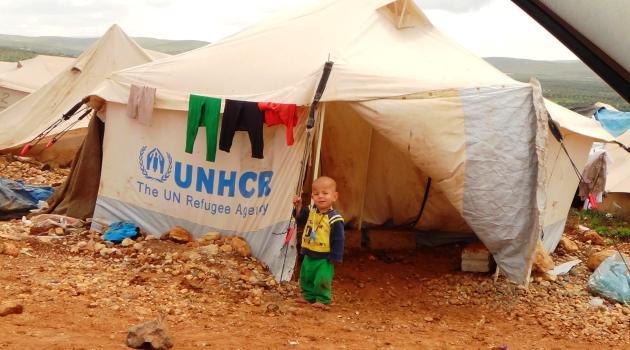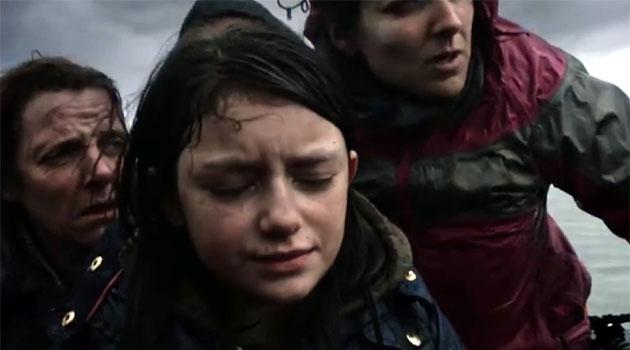"Czechs Are Helping" Initiative says number of families willing to house children from Greek refugee camps is rising, Interior Minister unmoved

The “Czechs Are Helping” Initiative has announced that compared to 50 families willing to take in child refugees from camps in Greece last year, this year 200 families have signed up with them to offer such aid. The initiative has called on the Czech Government to facilitate the provision of this assistance and to create an interministerial group to propose how exactly they should proceed.
Jaroslav Miko, the establisher of the initiative, announced the news at a press conference on 21 November. Greece asked the Czech Republic in September to take in 40 unaccompanied minors currently living in refugee camps there.
Due to various delays, Czech Government officials have not yet made any progress in those efforts. “There are currently roughly 200 families [willing to take in child refugees from Greece]. We are updating the list. Yes, some of the original families who signed up have withdrawn because they no longer believe it’s going to happen … They are saying they will re-apply later, though. On the other hand, other families have contacted us and their number has increased. Meetings have been held with some of them. I think that the fact that people were willing to travel to Prague from Ostrava or Zlín is enough of an illustration of their interest,” Miko said.
At the beginning of September, Greece called on the Interior Ministers of all EU Member States to take in unaccompanied minors from its refugee camps. Czech investigative news server Hlídací pes reported on the letter.
Czech Interior Minister Jan Hamáček (Czech Social Democratic Party – ČSSD) subsequently said that Greece was just attempting to revive the debate about redistributing refugees throughout the EU. He also said he did not see the point in relocating 17-year-olds all over Europe if they would not be entitled to asylum.
After making those remarks, the Czech Interior Minister took a long time to reply to the Greek letter. After he was criticized for the delay, he called on Athens earlier this month to provide a list of specific children whom the Czech Republic could receive.
Hamáček claims he sent a similar request to Greece one year ago, but never received an answer. The “Czechs Are Helping” Initiative, however, has pointed out that the Czech side is the party that has not been communicating.
“I’m convinced that the problem we are speaking of here decidedly does not concern Syrian orphans aged 10 or younger. The typical unaccompanied minor on the Greek side is a boy age 15 or older, very likely from Afghanistan or Pakistan. For such persons, their eventual integration is very complicated,” the Czech Interior Minister said on 21 November.
Hamáček added that he sees no reason to receive Pakistani refugees, because the EU has cconcluded a readmission agreement with Pakistan to repatriate its citizens. “In that case the Greek side should immediately respond by returning them to Pakistan,” he said.
Miko said the Czech Interior Minister asked for a list of just Syrian children last year, but the Greek side refused to choose those in need of relocation according to citizenship. “That situation is repeating itself. The minister is asking for a list of Syrian children once more. The Greek side has again repeated that it is not possible to separate the children on the basis of their nationality,” he said.
Amnesty International, the “Czechs Are Helping” Initiative, Doctors Without Borders and the Czech Republic-based Organization for Aid to Refugees (OPU) have all called on the Czech Government not to thwart this display of solidarity and to create an interministerial group to propose the exact process for receiving unaccompanied minors from the camps in Greece. Opposition politicians in the Chamber of Deputies also intend to pressure the cabinet on the issue.
Opposition lawmakers say they believe it is absurd that a rich country of 10 million people with a humanist tradition such as the Czech Republic has provided no aid to the situation in Greece for more than one year. “If we were to redistribute 40 children all over the republic that would mean four children in Prague and two in Liberec. That’s nothing,” said the vice-chair of the Mayors and Independents (STAN) party, Jan Farský.
Speaking at a press conference, Farský said that as a father of four he advocates aiding those who are suffering and in need of protection. He reminded journalists that during the Government of Czech Prime Minister Miloš Zeman (1998-2002), who is the President today, the country took in 50 000 refugees from different countries, 4 000 of whom were Afghanis.
All of that took place without any problems whatsoever and those people have integrated into Czech society. Farský said that currently the Czech Republic is much more wealthy, compared to the turn of the millenium, and the reception of 40 children who have undergone and are still undergoing unimaginably traumatizing situations would decidedly not damage the country economically.
The STAN vice-chair also pointed out that some politicians find it advantageous to behave in a populist way and brandish the excuse that receiving such people is a security risk. He clarified that in this respect, he is willing to place absolute faith in the Czech secret service, that there would be no impediment to intelligence officials investigating the children and the families willing to receive them, and that the choice of the children to receive is entirely up to the Czech side.
The attempt to fulfill the Czech Republic’s international obligations, including the Convention on the Rights of the Child, which the country ratified 30 years ago, has been supported by Czech MEP Michaela Šojdrová (Christian Democrats – KDU-ČSL) and also by Markéta Pekarová Adamová, the vice-chair of the TOP 09 party. Representatives of Doctors Without Borders and OPU have informed the public about the dismal conditions in the Greek camps where refugees, including adolescents and younger children, are living in tents without electricity even at this time of year, without any future prospects, for years at a time.
Last year a motion to receive 50 Syrian orphans from the camps in Greece was put forward by Czech MEP Šojdrová. Czech Prime Minister Andrej Babiš (Association of Dissatisfied Citizens – ANO) said at the time that the Czech Republic would not be receiving any migrants and that aid should go directly to the countries people are fleeing.
The Czech PM mentioned a plan to build an orphanage in Syria itself. The weekly RESPEKT recently reported that intention was never realized.
